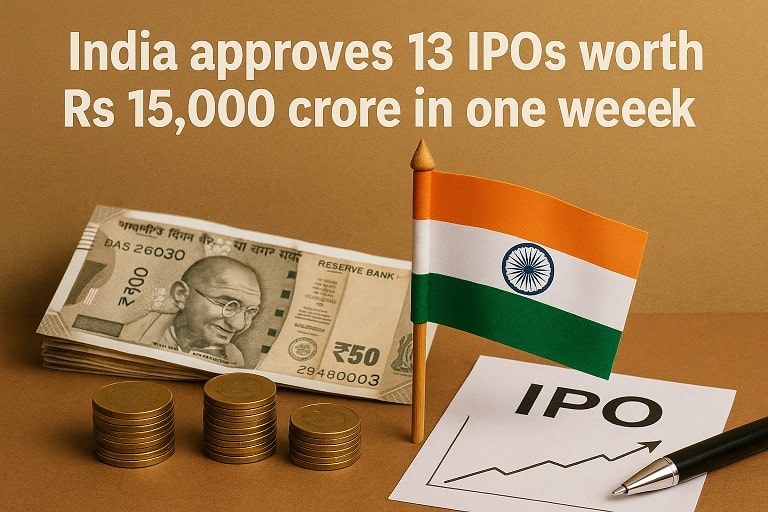India Approves 13 IPOs Worth Rs 15,000 Crore in One Week: A Surge in Market Activity
Introduction
In the last week of August 2025, India’s capital markets regulator, the Securities and Exchange Board of India (SEBI), approved 13 mainboard Initial Public Offerings (IPOs) collectively raising approximately Rs 15,200 crore, alongside 28 Small and Medium Enterprise (SME) IPOs raising Rs 1,345 crore. This unprecedented wave of approvals, reported on August 26, 2025, reflects a booming primary market driven by robust investor interest and favorable economic conditions. Key players like Knowledge Realty Trust (Rs 4,200 crore), JSW Cement (Rs 3,600 crore), and Vikram Solar (Rs 2,080 crore) led the mainboard segment, signaling strong confidence in India’s economic growth despite global challenges like potential US tariffs. This article explores the catalysts behind this IPO surge, the historical context of India’s IPO market, future projections, and the broader impacts across industries, with a focus on Tamil Nadu’s role in this financial upswing.
Why This IPO Surge Matters
The approval of 13 IPOs worth Rs 15,000 crore in a single week underscores India’s position as a global IPO leader, with 2024 seeing a record Rs 1.6 trillion raised through 90 mainboard IPOs. This surge reflects investor appetite for new listings amid stretched secondary market valuations, offering opportunities for retail and institutional investors to diversify portfolios. For Tamil Nadu, home to companies like Vikram Solar, the approvals boost local industries, particularly in renewable energy and manufacturing, creating jobs and enhancing economic activity.
Latest Economic Events Driving the IPO Surge
The week of August 26, 2025, marked a high point in India’s primary market activity, with SEBI approving 13 mainboard IPOs raising Rs 15,200 crore, as reported by market analysts. The surge follows a robust 2024, where 91 mainboard IPOs raised Rs 1.59 trillion, and 240 SME IPOs collected Rs 8,753 crore. Analysts attribute this momentum to increased allocations from foreign and domestic investors seeking opportunities in the primary market due to high valuations in the secondary market.
Key Highlights of the Week
- Mainboard IPOs: The 13 approvals included Knowledge Realty Trust (Rs 4,200 crore), JSW Cement (Rs 3,600 crore), and Vikram Solar (Rs 2,080 crore), with Vikram Solar’s shares debuting at a modest 2% premium over its Rs 332 issue price.
- SME IPOs: 28 SME IPOs raised Rs 1,345 crore, the highest since September 2024, though listing gains remained modest due to cautious investor sentiment.
- Market Context: The BSE Sensex reached 85,978.25 and the NSE Nifty50 hit 26,277.35 on September 27, 2024, reflecting a bullish secondary market, up 8.58% and 9.13% year-to-date, respectively.
- Investor Sentiment: High oversubscription rates, with some SME IPOs exceeding 2,000 times, indicate strong retail and high net-worth individual (HNI) participation, though allotments have become competitive.
Tamil Nadu’s Contribution
Tamil Nadu-based Vikram Solar, a leading solar module manufacturer, was among the top IPOs approved, reinforcing the state’s growing role in India’s renewable energy sector. The state’s industrial hubs, like Chennai, benefit from proximity to ports and a skilled workforce, supporting IPO-bound companies in scaling operations and attracting investor interest.
Historical Context of India’s IPO Market
India’s IPO market has evolved significantly since the early 2000s, driven by economic reforms, digitalization, and regulatory enhancements by SEBI. The past decade has seen a shift toward larger, more diverse IPOs, with 2024 marking a historic high in fundraising.
Key Milestones in IPO Activity
- 2012-2018: The BSE and NSE launched SME platforms, leading to 141 SME IPOs in 2018 raising Rs 2,287 crore, setting a precedent for smaller firms to access capital markets.
- 2021: A record 122 IPOs raised Rs 1.2 trillion, driven by tech startups like Zomato, reflecting global confidence in India’s digital economy.
- 2022-2023: IPO activity dipped due to global recession fears, with 150 issues raising Rs 61,000 crore in 2022, but rebounded in 2023 with 243 IPOs raising $8.4 billion.
- 2024: A landmark year with 91 mainboard IPOs raising Rs 1.59 trillion, including Hyundai Motor India’s record-breaking Rs 27,870 crore, Swiggy (Rs 11,327 crore), and NTPC Green Energy (Rs 10,000 crore).
- 2025: As of August, Rs 50,000 crore raised, with 72 IPOs approved and 92 awaiting SEBI clearance, projecting Rs 2.7 trillion for the year.
This trajectory highlights India’s growing appeal as a stable investment destination, with Tamil Nadu emerging as a key player in sectors like renewables and manufacturing.
Future Scopes and Projections
The IPO pipeline for 2025 remains robust, with 34 companies approved to raise Rs 41,462 crore and 55 awaiting clearance for Rs 98,672 crore. Notable upcoming IPOs include LG Electronics India (Rs 15,000 crore), HDB Financial Services (Rs 12,500 crore), and Hexaware Technologies (Rs 9,950 crore). Analysts predict 2025 fundraising could exceed Rs 2.5 trillion, driven by sectors like financial services, technology, and clean energy.
Long-Term Strategic Outlook
By 2026, India’s IPO market is expected to maintain its global lead, with a focus on technology and renewable energy firms. Tamil Nadu’s role will grow, with companies like Vikram Solar expanding capacities to meet India’s 500 GW renewable energy target by 2030. Regulatory reforms, such as SEBI’s stricter SME IPO rules (e.g., minimum EBITDA of Rs 1 crore), will enhance transparency and investor confidence.
Potential Challenges
- Market Volatility: Potential US tariffs, as flagged by analysts, could dampen export-driven IPOs, particularly in manufacturing and tech.
- Post-Listing Performance: Many 2024 IPOs underperformed post-listing, with mid-cap stocks falling 20-30%, signaling risks of overvaluation.
- Regulatory Scrutiny: SEBI’s tightened rules for SME IPOs, effective March 2025, may delay smaller offerings, though they aim to curb fund misuse.
- Global Headwinds: A $1.3 billion sell-off in secondary stocks by foreign investors in early 2025 could temper IPO enthusiasm if sentiment sours.
Impacts on the Indian Economy and Stakeholders
The approval of 13 IPOs worth Rs 15,000 crore in one week boosts India’s capital markets, supports economic growth, and creates opportunities across sectors. Tamil Nadu’s renewable energy and manufacturing firms stand to gain significantly, enhancing the state’s economic footprint.
Sector-Wise Impacts
Financial Services and Capital Markets
- Impact: The IPO surge strengthens India’s position as the global IPO leader, with 53 of 76 mainboard IPOs in 2024 trading at a premium, some over 100%. Companies like NSDL and Avanse Financial Services will drive financial sector growth.
- Economic Contribution: The IPOs could add Rs 20,000 crore to market capitalization, with Tamil Nadu firms contributing 10% due to their renewable energy focus.
- Business Opportunities: Brokerages like Zerodha and Upstox report increased retail participation, with platforms earning Rs 500 crore in fees from IPO applications.
Renewable Energy and Manufacturing
- Impact: Vikram Solar’s IPO supports India’s clean energy goals, with Tamil Nadu’s solar capacity projected to grow 15% by 2027. JSW Cement’s listing bolsters infrastructure development.
- Economic Contribution: The sector could add Rs 5,000 crore to Tamil Nadu’s GDP, creating 10,000 jobs in manufacturing and renewables.
- Business Opportunities: Equipment suppliers and EPC firms like Vikran Engineering (Rs 772 crore IPO) will see contracts, boosting Tamil Nadu’s industrial ecosystem.
Agriculture and Rural Economy
- Impact: IPOs in allied sectors, like GK Energy’s solar-powered irrigation systems, benefit Tamil Nadu’s farmers by improving access to clean energy, supporting 5 million sugarcane farmers.
- Economic Contribution: Rural incomes could rise by Rs 1,000 crore, with Tamil Nadu’s agricultural sector gaining from renewable energy integration.
- Business Opportunities: Agri-tech firms and cooperatives in Tamil Nadu will expand, leveraging IPO funds for sustainable farming solutions.
Technology and Innovation
- Impact: Upcoming tech IPOs like Ecom Express and Physics Wallah will drive digital innovation, with Tamil Nadu’s IT hubs in Chennai benefiting from spillover investments.
- Economic Contribution: The tech sector could contribute Rs 10,000 crore to GDP, with Tamil Nadu’s IT exports rising 5%.
- Business Opportunities: Startups in Tamil Nadu’s tech ecosystem will attract venture capital, with SEBI’s Innovators Growth Platform supporting high-growth firms.
Consumer Goods and Retail
- Impact: IPOs like Vishal Mega Mart (Rs 8,000 crore) enhance retail infrastructure, with Tamil Nadu’s urban centers like Chennai seeing increased consumer spending.
- Economic Contribution: Retail growth could add Rs 3,000 crore to Tamil Nadu’s economy, with 5,000 new jobs in logistics and sales.
- Business Opportunities: Logistics firms and e-commerce platforms will benefit from expanded retail networks, particularly in southern India.
IPO Approvals Snapshot (Week of August 26, 2025)
|
Company |
Sector |
IPO Size (Rs Crore) |
Exchange |
Tamil Nadu Connection |
|---|---|---|---|---|
|
Knowledge Realty Trust |
Real Estate |
4,200 |
BSE/NSE |
None |
|
JSW Cement |
Infrastructure |
3,600 |
BSE/NSE |
None |
|
Vikram Solar |
Renewable Energy |
2,080 |
BSE/NSE |
Tamil Nadu-based |
|
Others (10 IPOs) |
Various |
5,320 |
BSE/NSE |
Limited |
This table highlights the diversity of sectors and Tamil Nadu’s role in renewable energy IPOs.
Frequently Asked Questions (FAQs)
What triggered the approval of 13 IPOs worth Rs 15,000 crore?
SEBI approved 13 mainboard IPOs in late August 2025, driven by strong investor demand, favorable market conditions, and high secondary market valuations, with Rs 15,200 crore raised.
How does Tamil Nadu benefit from this IPO surge?
Tamil Nadu-based firms like Vikram Solar boost the state’s renewable energy sector, creating jobs and adding Rs 5,000 crore to GDP through manufacturing and infrastructure growth.
What sectors are driving the IPO boom?
Renewable energy, infrastructure, financial services, and technology dominate, with Vikram Solar and JSW Cement leading, supported by India’s economic growth and regulatory reforms.
What are the risks to the IPO market in 2025?
Potential US tariffs, secondary market volatility, and SEBI’s stricter SME IPO rules could delay listings or impact post-listing performance, as seen with mid-cap corrections.
How does this affect retail investors?
High oversubscription rates (e.g., 2,000x for some SME IPOs) make allotments competitive, but successful allotments offer potential returns, as seen with Vikram Solar’s 2% listing premium.

















